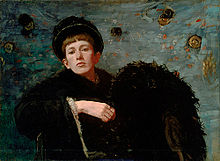Ellen Day Hale
| Ellen Day Hale | |
|---|---|

Self-Portrait, oil on canvas, 1885, (28 1/2" x 39") Museum of Fine Arts, Boston
|
|
| Born |
February 11, 1855 Worcester, Massachusetts |
| Died | February 11, 1940 (aged 85) Brookline, Massachusetts |
| Nationality | American |
| Education | Académie Julian |
| Known for | Painting, printmaking |
Ellen Day Hale (February 11, 1855 – February 11, 1940) was an American Impressionist painter and printmaker from Boston. She studied art in Paris and during her adult life lived in Paris, London and Boston. She exhibited at the Paris Salon and the Royal Academy of Arts. Hale wrote the book History of Art: A Study of the Lives of Leonardo, Michelangelo, Raphael, Titian, and Albrecht Dürer and mentored the next generation of New England female artists, paving the way for widespread acceptance of female artists.
Ellen Day Hale was born on February 11, 1855 in Worcester, Massachusetts, into an elite Boston Brahmin family. Hale's father was author and orator Edward Everett Hale, and her mother was Emily Baldwin Perkins. Although the Hale family was well respected among the Boston upper class, they were not exceptionally wealthy. Her father acted as a Unitarian chaplain in the U.S. Senate from 1904 until his death in 1909, and Hale often assisted her father in his church-related duties. Hale was one of eight children, and she helped her mother and father take care of her younger siblings. From a young age, Hale was raised within an artistic atmosphere, as her mother encouraged her interest in art, and her aunt, watercolorist Susan Hale, most likely provided her first artistic instruction. Her brother was Philip Leslie Hale, a celebrated artist and art critic, and he married Lilian Westcott Hale, an Impressionist painter.
Hale's family background provided her with a network of strong female role models. Her great-aunt was Harriet Beecher Stowe, abolitionist and author of the anti-slavery novel Uncle Tom's Cabin. Educator Catharine Beecher and suffragist Isabella Beecher Hooker were also great-aunts. One of Hale’s first cousins was writer and social reformer Charlotte Perkins Gilman, best known for her short story "The Yellow Wallpaper". In all likelihood, this group of influential women impacted Hale's sense of self and inspired her own activist efforts later in life.
...
Wikipedia
